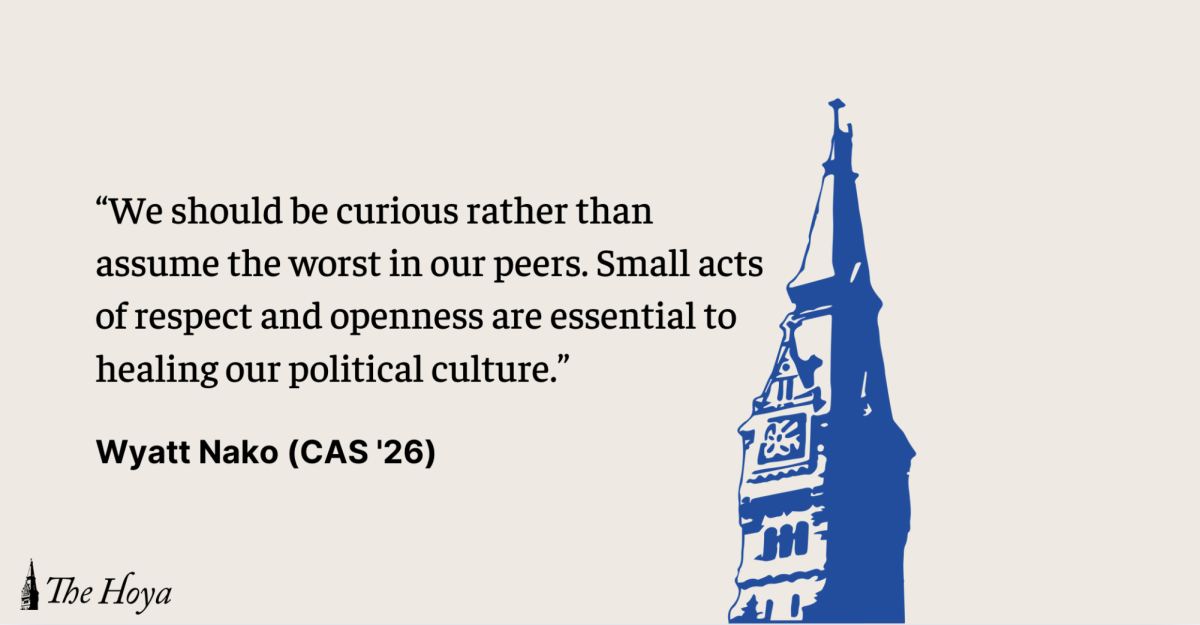
A little over a week ago, flyers appeared on campus violently referencing Charlie Kirk’s assassination, followed days later by others referring to the Ku Klux Klan. These flyers reflect our current political culture, characterized by a refusal to engage and, at times, by hatred. At an institution that trains future leaders, we must instead have the courage to build a culture of well-intentioned and active engagement with “the other side.”
From my classes and various social circles on campus, I’ve noticed that many Georgetown University students are scared to talk — and some are scared to listen. Peers expect you to know your beliefs, to hold them firmly and to always hold the “right” ones. That expectation creates fear on both ends: a fear of speaking your mind (which, for me, is usually, “I don’t know”) and a fear of listening to alternative viewpoints in case you change your mind (God forbid).
The end result is a toxic culture where we’re afraid of meaningful engagement altogether.
Because liberal students outnumber conservatives six to one on campus, I believe it’s easy to assume a “standard” set of political stances consistent with liberal to progressive platforms. As such, students may fear that by diverging from this standard, even slightly, they risk facing quick judgment, gossip from their peers and damage to their friendships and reputations.
The problem of polarization extends beyond Georgetown. In January, college administrators nationwide discussed how to address polarization on their campuses at the American Association of Colleges and Universities’ annual conference. In July, BridgeUSA, the largest student movement dedicated to political depolarization, gathered 180 student chapter leaders from across the country to share their efforts at fostering dialogue on their campuses. College students and administrators alike want to see a healthier political culture.
Meanwhile, the disturbing flyers on our campus made national headlines, showing how polarization at Georgetown is being closely watched. The question is how we address this problem and, more specifically, what we as students can do about it on our campus.
Georgetown’s world of student organizations is key to our political culture.
Club leaders should ensure that when disagreements among members arise, they are capable of working them out. To do this, student leaders must try not to ascribe what becomes the standard set of political stances and instead treat members with respect, regardless of their personal opinions.
These differences in viewpoints come from differences in experiences, upbringings and values. If we claim to be a community in diversity, we should value and respect viewpoint diversity. We should be curious rather than assume the worst in our peers. Small acts of respect and openness are essential to healing our political culture.
On a broader scale, collaborative events between opposing political clubs are rare. They tend to only include the Georgetown Bipartisan Coalition’s flag planting events and their biannual debates.
These events alone are not enough to build a lasting culture of understanding among students. We need debates, speaker events and frequent and open dialogues that encourage student-participants to speak authentically, to listen with grace and to question in good faith. Only then can we realize the ideals of free speech and civic engagement that we aspire to uphold.
Georgetown is a relatively small campus where student leaders shape campus culture. While administrative policies are slow to change, new events and traditions are always emerging. Together, we can create a culture of active listening and respectful disagreements — one conversation at a time.
Students of all political affiliations, but, most importantly, liberals and progressives who make up the majority on campus: Try to listen to those you disagree with. I understand it isn’t easy to be the first to reach out, but it is the only first step toward changing our campus political culture. No one wants to go to a college — or live in a world — where threats and acts of political violence are frequent and normalized. So talk to someone you disagree with, and listen to them.
Wyatt Nako is a senior in the College of Arts & Sciences.